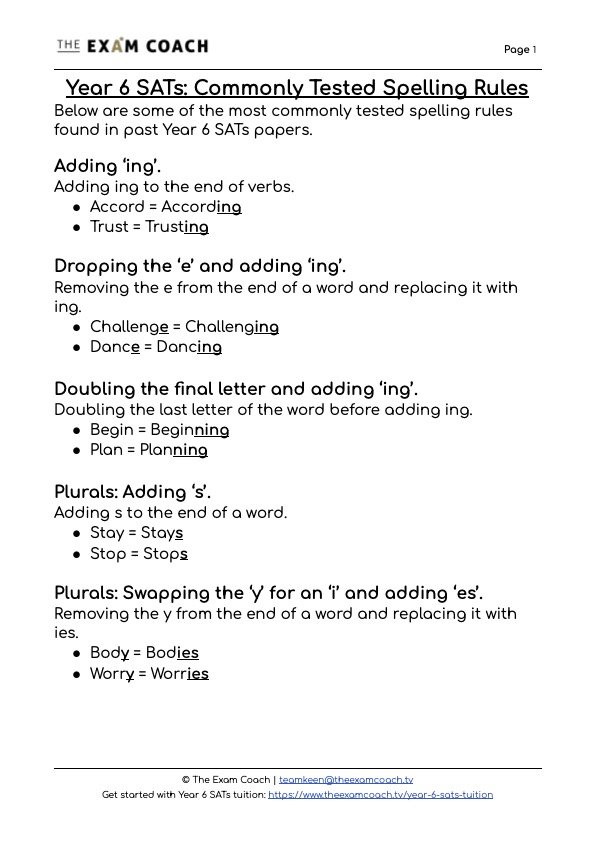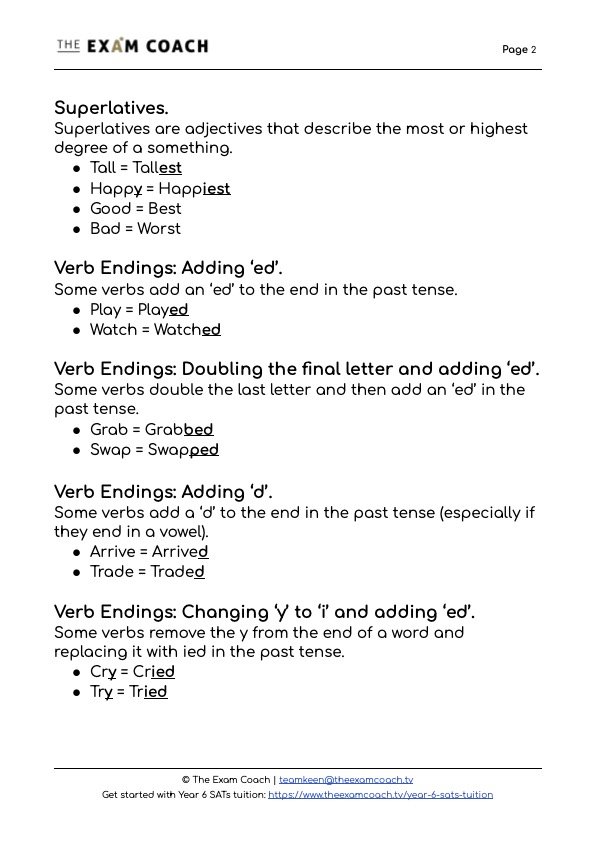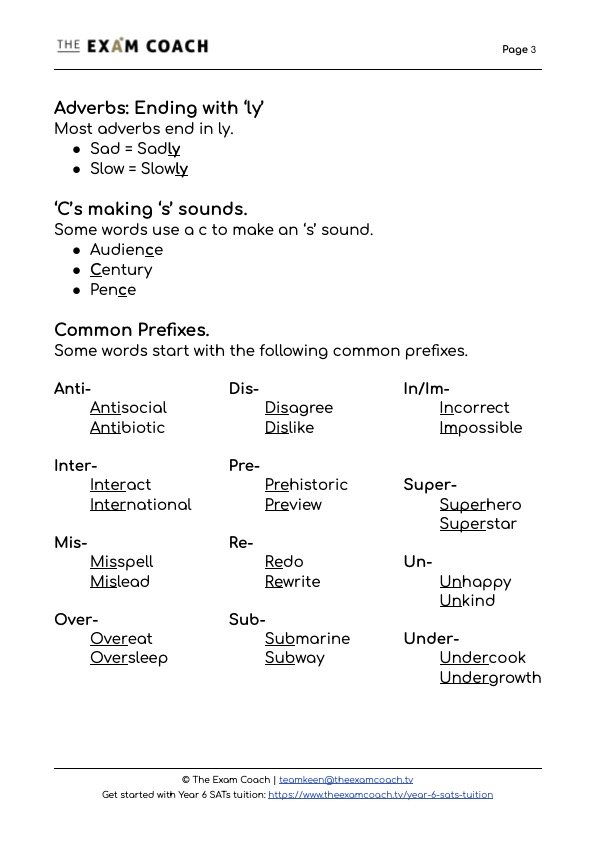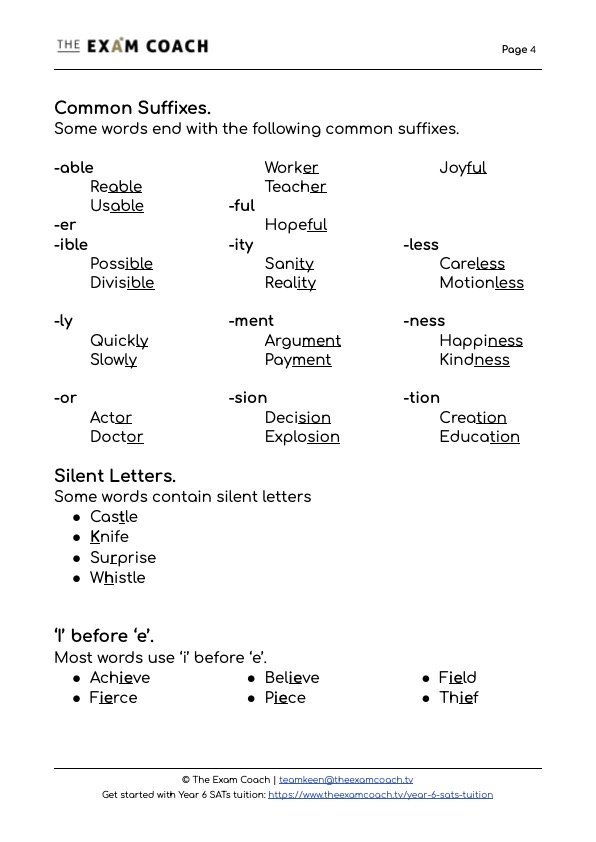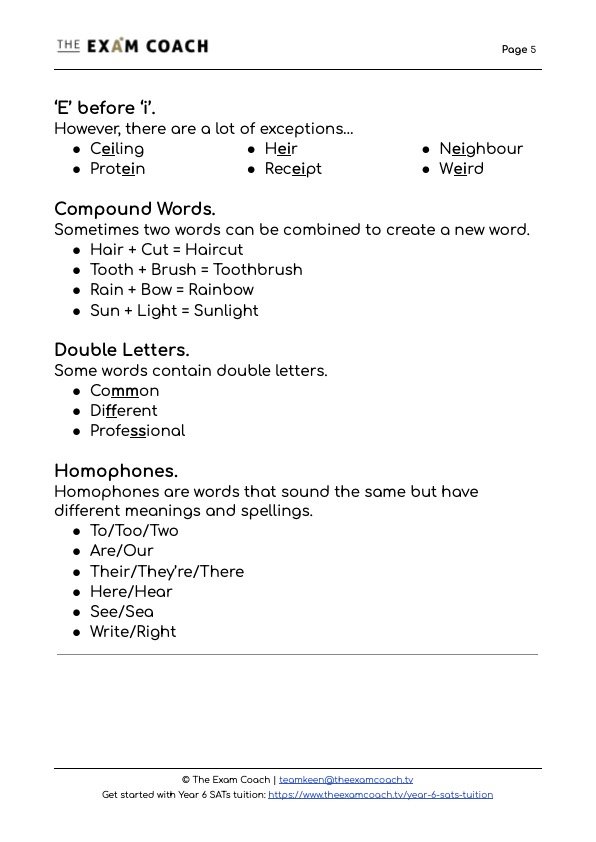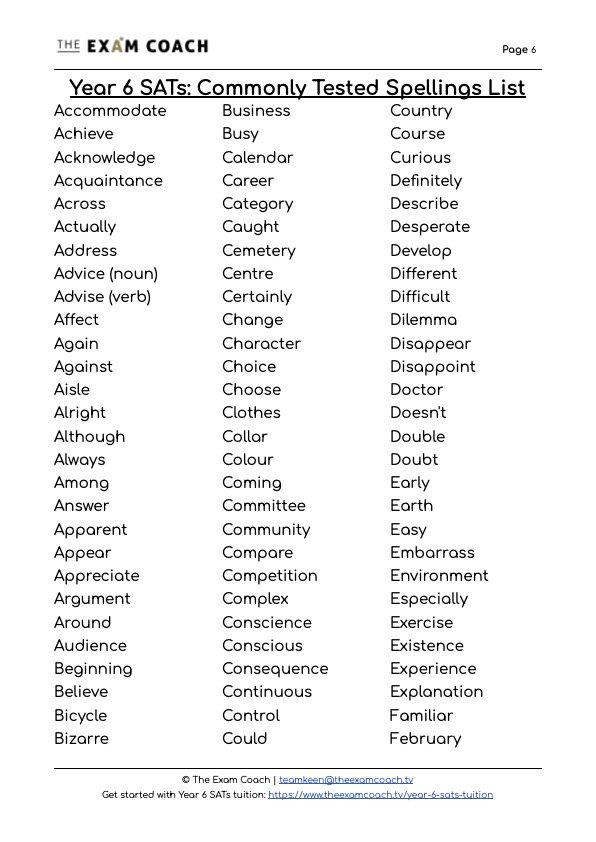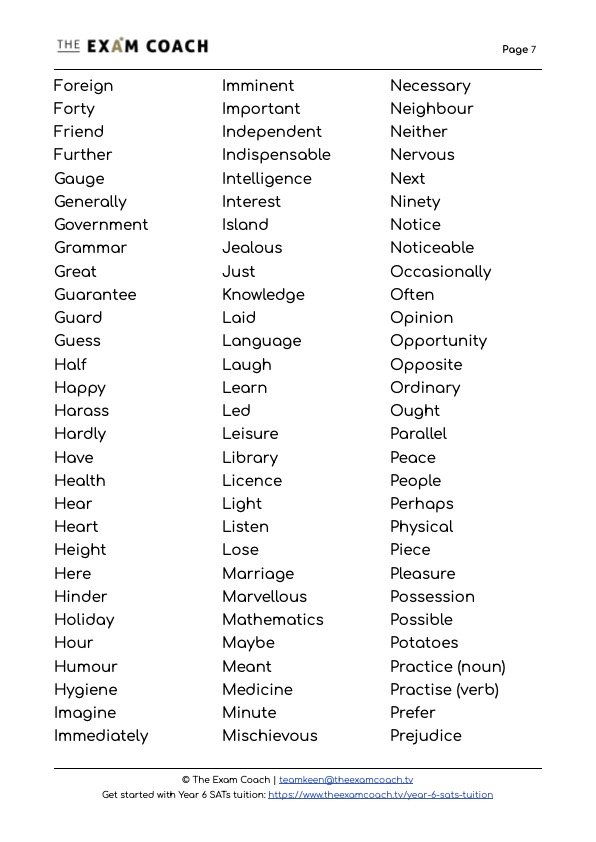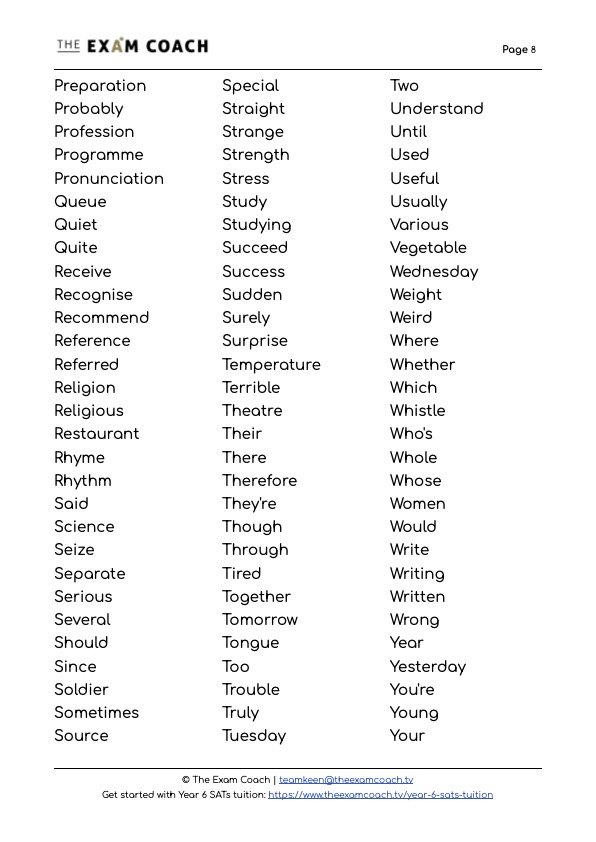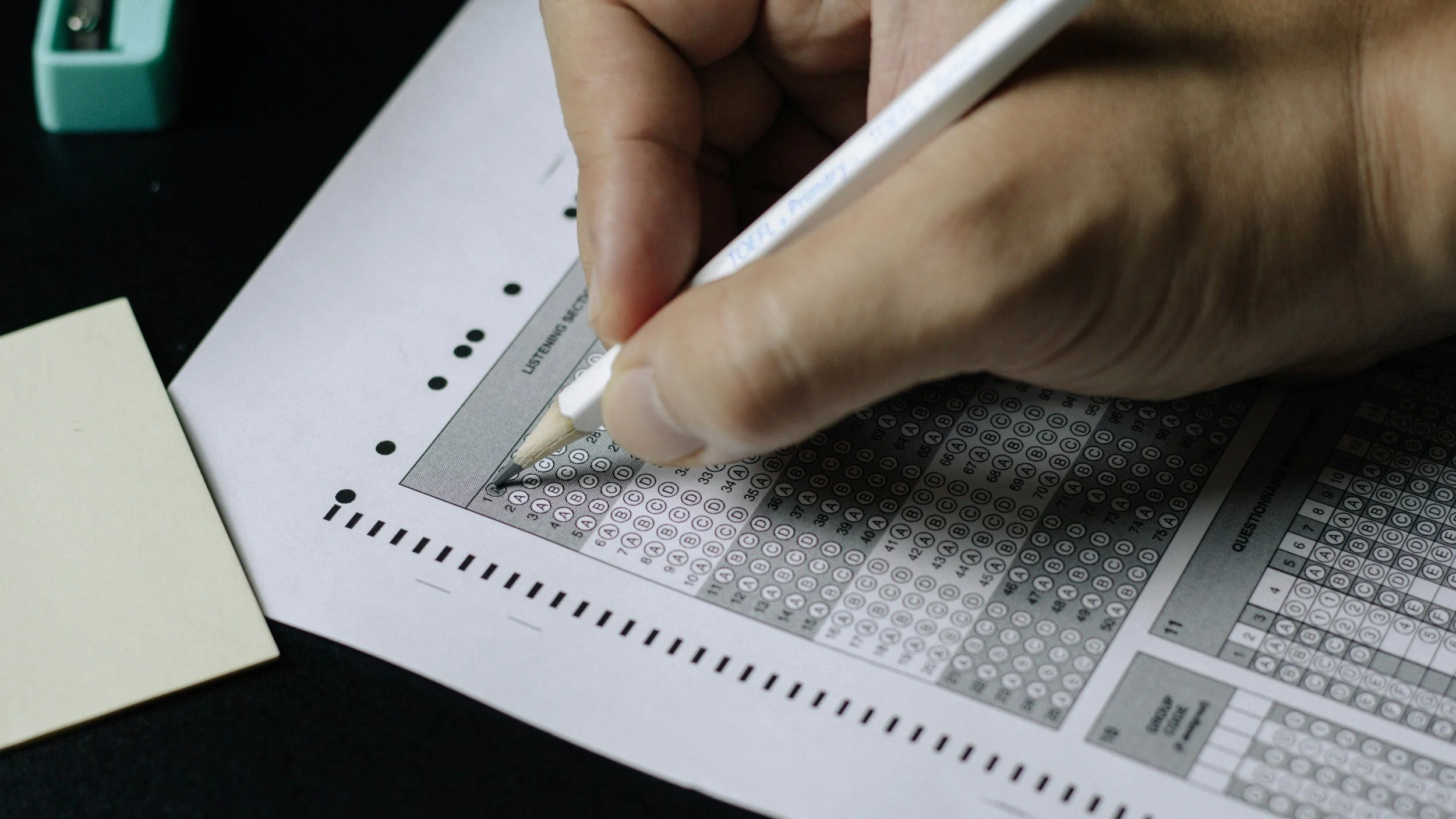Each year in the UK, Year 6 students across the country take their Year 6 SATs. These are often the first formal exams a child sits and can be a stressful period for both parents and children. There are often many questions about the process and what it involves, so we’ve put together this guide to help you understand what the Year 6 SATs’ six exam papers include.
Contents
Year 6 SATs – General Information
What are the Year 6 SATs?
What subjects are tested in the Year 6 SATs?
What SATs papers do children take in Year 6?
When are the Year 6 SATs taken?
Where are the year 6 SATs taken?
How are SATs marked?
What are SATs results used for?
English Grammar, Punctuation and Spelling Paper 1
English Grammar, Punctuation and Spelling Paper 2
English Reading Paper 1
Mathematics Arithmetic Paper 1
Mathematics Reasoning Paper 2
Mathematics Reasoning Paper 3
SATs Preparation
Do children need to revise for their SATs?
Where can I find practice materials for the Year 6 SATs?
How can I help my child prepare for the SATs?
Year 6 SATs – General Information
What are the Year 6 SATs?
SATs stands for Standard Assessment Tests. They are national curriculum tests taken by children in Year 6 to assess their progress at key stage 2.
What subjects are tested in the Year 6 SATs?
English and mathematics.
What SATs papers do children take in Year 6?
Children in Year 6 take the following SATs papers:
English Grammar, Punctuation and Spelling Paper 1
English Grammar, Punctuation and Spelling Paper 2
English Reading Comprehension
Mathematics Arithmetic Paper 1
Mathematics Reasoning Paper 2
Mathematics Reasoning Paper 3
When are the Year 6 SATs taken?
Year 6 SATs are sat in May and take place over one week.
Where are the year 6 SATs taken?
Year 6 SATs are taken at your child’s primary school.
How are SATs marked?
All Year 6 SATs tests are marked externally, and the results are returned to the school. Each child is then given a scaled score that ranges from 80 to 120. A score of 100 or more means that the child has achieved the expected standard.
Parents receive their child's SATs results during the first half of July.
What are SATs results used for?
Year 6 SATs results are used to measure both the school's and each child’s progress and achievements in key stage 2.
These results are then used by secondary schools to initially stream students into sets based on academic ability in Year 7. The set your child is streamed into can significantly impact their future GCSE and A Level grades.
English Grammar, Punctuation and Spelling Paper 1
How long is English Grammar, Punctuation and Spelling Paper 1?
The English Grammar, Punctuation and Spelling Paper 1 lasts 45 minutes.
How many marks are available in English Grammar, Punctuation and Spelling Paper 1?
There are 50 marks available in this paper.
What topics are covered in English Grammar, Punctuation and Spelling Paper 1?
This paper covers a wide range of grammar, punctuation and spelling topics, including:
Word classes: nouns, verbs, adjectives, adverbs, pronouns, prepositions, conjunctions, determiners
Sentence types: simple, compound, complex
Punctuation: commas, apostrophes, full stops, question marks, exclamation marks, colons, semicolons, brackets, dashes, hyphens
Spelling: common exception words, prefixes, suffixes, homophones
What question types are found in English Grammar, Punctuation and Spelling Paper 1?
This paper consists of a variety of short answer questions, including:
Multiple choice
Matching
Fill in the blanks
Sentence correction
Identifying grammatical errors
What is the expected standard for Year 6 in this paper?
To achieve the expected standard in this paper, children need to demonstrate a good understanding of the grammar, punctuation and spelling topics listed above. They need to be able to apply this knowledge to a variety of tasks, and they need to be able to spell a range of words correctly.
What is a good score?
A scaled score of 100 or more means that a child has met the expected standard. This is the national benchmark.
English Grammar, Punctuation and Spelling Paper 2
How long is English Grammar, Punctuation and Spelling Paper 2?
The English Grammar, Punctuation and Spelling Paper 2 lasts 20 minutes.
How many marks are available in English Grammar, Punctuation and Spelling Paper 2?
There are 20 marks available in this paper.
What topics are covered in English Grammar, Punctuation and Spelling Paper 2?
This paper focuses solely on spelling. It tests children's ability to spell a range of words, including:
Common exception words
Words with prefixes and suffixes
Homophones
What question types are found in English Grammar, Punctuation and Spelling Paper 2?
This paper consists of a series of spelling questions, where children are given a word and asked to spell it correctly. Each word is read aloud to the students twice and also provided in the context of a sentence.
What is the expected standard for Year 6 in this paper?
To achieve the expected standard in this paper, children need to demonstrate a strong grasp of spelling rules and patterns. They should be able to spell a wide range of words accurately, including those that are often misspelt.
What is a good score?
A scaled score of 100 or more means that a child has met the expected standard. This is the national benchmark.
English Reading Paper 1
How long is English Reading Paper 1?
The English Reading Paper 1 lasts 60 minutes.
How many marks are available in English Reading Paper 1?
There are 50 marks available in this paper.
What topics are covered in English Reading Paper 1?
This paper assesses a child's ability to:
Understand and interpret texts: This includes comprehending the main ideas, supporting details, and underlying messages.
Analyse and evaluate texts: This involves examining the author's purpose, the text's structure, and the use of language techniques.
Make inferences and draw conclusions: This requires children to read between the lines and use clues from the text to form their own interpretations.
Summarise and retell: This involves condensing the key points of a text and presenting them in a clear and concise manner.
The passages in the paper can cover a wide range of topics and genres, such as fiction, non-fiction, poetry, historical texts, and informational texts.
What question types are found in English Reading Paper 1?
The paper includes a variety of question types, including:
Multiple-choice questions: Children select the correct answer from a given set of options.
Short-answer questions: Children provide brief written responses to questions about the text.
Open-ended questions: Children write more extended responses, such as summaries or explanations.
What is the expected standard for Year 6 in this paper?
To achieve the expected standard, children need to demonstrate a strong understanding of the text. They should be able to:
Read fluently and accurately
Understand complex ideas and information
Make connections between different parts of the text
Evaluate the writer's choices and techniques
Respond critically to the text
What is a good score?
A scaled score of 100 or more means that a child has met the expected standard. This is the national benchmark.
Mathematics Arithmetic Paper 1
How long is Maths Arithmetic Paper 1?
The Maths Arithmetic Paper 1 lasts 30 minutes.
How many marks are available in Maths Arithmetic Paper 1?
There are 40 marks available in this paper.
What topics are covered in Maths Arithmetic Paper 1?
This paper assesses a child's ability to perform basic arithmetic operations, including:
Addition
Subtraction
Multiplication
Division
Fractions
Decimals
Percentages
What question types are found in Maths Arithmetic Paper 1?
The paper consists of a series of calculations that children must solve. These calculations can range from simple to complex and may involve multiple steps. Children must write their answer in the provided box for each question.
What is the expected standard for Year 6 in this paper?
To achieve the expected standard, children need to demonstrate a strong understanding of arithmetic operations and be able to apply them accurately and efficiently. They should be able to:
Calculate accurately and efficiently
Use formal written methods for addition, subtraction, multiplication, and division
Solve problems involving fractions, decimals, and percentages
What is a good score?
A scaled score of 100 or more means that a child has met the expected standard. This is the national benchmark.
Mathematics Reasoning Paper 2
How long is Maths Reasoning Paper 2?
The Maths Reasoning Paper 2 lasts 40 minutes.
How many marks are available in Maths Reasoning Paper 2?
There are 35 marks available in this paper.
What topics are covered in Maths Reasoning Paper 2?
This paper assesses a child's ability to apply their mathematical knowledge to solve a range of problems. It covers a broad range of topics, including:
Number: Place value, number sequences, number facts, calculations, fractions, decimals, percentages, and ratio and proportion.
Measurement: Length, mass, capacity, time, money, and area and perimeter.
Geometry: Properties of shapes, position and direction, and angles.
Statistics: Data handling, interpreting charts and graphs, and probability.
What question types are found in Maths Reasoning Paper 2?
The paper consists of a series of calculations that children must solve. These calculations can range from simple to complex and may involve multiple steps. The questions in this paper apply to more lifelike scenarios, and situations. Children must write their answer in the provided box for each question.
What is the expected standard for Year 6 in this paper?
To achieve the expected standard, children need to demonstrate a strong understanding of mathematical concepts and be able to apply them to solve a range of problems. They should be able to:
Reason mathematically
Solve problems systematically
Explain their reasoning clearly
Use appropriate mathematical language
What is a good score?
A scaled score of 100 or more means that a child has met the expected standard. This is the national benchmark.
Mathematics Reasoning Paper 3
How long is Maths Reasoning Paper 3?
The Maths Reasoning Paper 3 lasts 40 minutes.
How many marks are available in Maths Reasoning Paper 3?
There are 35 marks available in this paper.
What topics are covered in Maths Reasoning Paper 3?
Similar to Paper 2, this paper assesses a child's ability to apply their mathematical knowledge to solve a range of problems. It covers a broad range of topics, including:
Number: Place value, number sequences, number facts, calculations, fractions, decimals, percentages, and ratio and proportion.
Measurement: Length, mass, capacity, time, money, and area and perimeter.
Geometry: Properties of shapes, position and direction, and angles.
Statistics: Data handling, interpreting charts and graphs, and probability.
What question types are found in Maths Reasoning Paper 3?
The paper consists of a series of calculations that children must solve. These calculations can range from simple to complex and may involve multiple steps. The questions in this paper apply to more lifelike scenarios, and situations. Children must write their answer in the provided box for each question.
What is the expected standard for Year 6 in this paper?
To achieve the expected standard, children need to demonstrate a strong understanding of mathematical concepts and be able to apply them to solve a range of problems. They should be able to:
Reason mathematically
Solve problems systematically
Explain their reasoning clearly
Use appropriate mathematical language
What is a good score?
A scaled score of 100 or more means that a child has met the expected standard. This is the national benchmark.
SATs Preparation
Do children need to revise for their SATs?
While SATs are designed to assess what children have learned throughout their primary school years, some revision can be greatly beneficial. It can help reinforce their understanding of key concepts and build confidence.
We’d recommend focusing on topics your child finds challenging and practising the key SATs skills as much as possible.
Where can I find practice materials for the Year 6 SATs?
How can I help my child prepare for the SATs?
There are many ways you can support your child's preparation for their SATs.
1. Year 6 SATs Tuition 👩🏫
Tuition can be a useful tool to assist your child’s preparation for the Year 6 SATs because it can help them progress faster than they otherwise would do at school. There are several different types of tuition available for Year 6 SATs students, each with their own benefits.
🙋🏿♂️ Individual Tuition: learning alone provides a 1-on-1 environment in which some students thrive due to uninterrupted attention from a tutor. This can be done in-person or online, and it can achieve great results for your child. Particularly in subjects such as maths and reasoning, where students are required to fully understand each step of the question in order to arrive at the correct answer.
👨👧👧 Group Tuition: group tuition provides a collaborative learning environment where students can interact with peers and learn from each other, as well as their tutor. A collaborative learning environment is especially helpful in Year 6 SATs subjects such as English comprehension, grammar, punctuation and spelling. Students can listen to and analyse each other’s answers in order to improve and refine their own.
Group Year 6 SATs tuition can achieve exceptional results compared to a class in school because all of the children are highly-motivated and ready to learn. The tutor must also teach the class at the appropriate level to achieve excellent Year 6 SATs performance, not at the level of the least able student (as in school). It's also a more cost-effective option.
👩🏽🏫 In-Person Tuition: this traditional approach involves face-to-face sessions with a tutor, either individually or in a small group. In-person tuition allows for personalised attention and immediate feedback, but it can often be less thoroughly planned and more improvised than online tuition.
👩🏼💻 Online Tuition: learning online is an increasingly popular choice. It offers flexibility and convenience, allowing students to learn from the comfort of their own homes with top-rated tutors from across the UK.
Furthermore, the lesson plans are more robust and less improvised than in-person tuition because, in order to effectively deliver an online lesson, the teacher absolutely must have a variety of pre-prepared and well structured resources ready to be shown through the screen.
⏩ Intensive Courses: intensive courses are designed to cover a significant amount of material in a short period of time. They're ideal for parents who want a more structured learning programme with a clear start and end point. At times, tuition sessions can drag on without the progress or structure of the learning totally evident. Intensive courses are a good remedy for this problem.
The Exam Coach: Your Partner In Year 6 SATs Tuition
The Exam Coach delivers group online tuition for children studying to sit the Year 6 SATs exam. We offer weekly online tuition workshops that fit in with your schedule and set your child on a steady path of improvement.
Our 11 Plus Tuition Model
👨🏼🏫 Expert Tutors: our tutors are experienced, top-performing teachers who are passionate about helping children succeed in the Year 6 SATs exams.
✅ Proven Approach: our approach is based on years of experience and has helped countless students achieve their goals.
🎯 Targeted Skill Development: sessions are focused on essential Year 6 SATs exam techniques and skill development in order to score marks in the exam.
⏰ Online and Flexible: our online tuition options offer flexibility and convenience, allowing your child to learn from home.
📚 Comprehensive Preparation: we specialise in the core Year 6 SATs disciplines, including English comprehension, spelling, punctuation and grammar.
🏆 Build Exam Confidence: our supportive and encouraging group learning environment helps build your child's confidence and reduces anxiety about the SATs.
With The Exam Coach tuition team, your child will be well-prepared and confident on exam day.
Our monthly class pass offers flexibility and value, allowing your child to attend multiple sessions and benefit from consistent support.
2. Practice Papers and Mock Exams 📝
Practice papers are a vital preparation resource for several reasons:
😱 Familiarisation with Format: working through practice papers helps your child become comfortable with the structure, timing, and types of questions they'll encounter in the actual SATs. This is especially useful if the SATs will be their first formal exams.
🔎 Identify Areas for Improvement: by reviewing their answers with a mark schemes, you can work with your child to pinpoint their strengths and weaknesses.
💪 Build Exam Technique: practice papers help develop essential exam skills, such as time management, careful reading, and clear answer presentation.
Click the buttons below to access our free Year 6 SATs papers and resources.
3. Focus on Key Skills 🔑
The fundamental concepts of KS2 maths and English are what will be tested in the SATs.
📚 Regular Reading: encourage your child to read a wide variety of texts – fiction, non-fiction, poetry, magazines. Reading exposes them to different writing styles, expands their vocabulary, and helps them develop a strong grasp of grammar and punctuation in context.
➗ Mental Maths: practice mental maths regularly. Quick recall of number facts, times tables, and mental calculation strategies are essential for success in the Maths papers. Use games, flashcards, and everyday situations (like shopping) to make it fun.
✏️ Spelling: create a spelling diary or use flashcards to focus on tricky words, common exception words, and spelling rules. Encourage your child to use new words in their writing and conversation.
🗣️ Vocabulary Expansion: expand your child's vocabulary by introducing new words, exploring synonyms and antonyms, and discussing word meanings. A rich vocabulary improves reading comprehension and writing skills.



